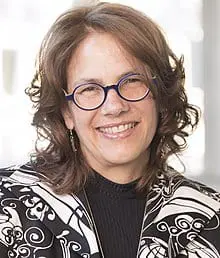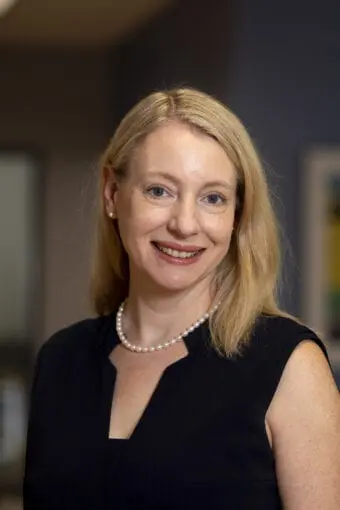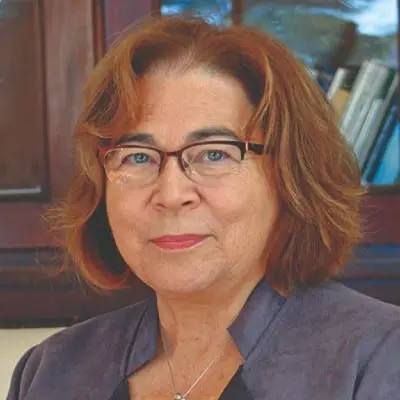Re-Opening the Nation: Should We Turn to Immunity Testing?
A Hastings Conversation with
Françoise Baylis, Dakota Gruener, Gigi Gronvall, and Mildred Solomon
Some suggest using immunity certification as a path to returning to some sense of normalcy. Despite unclear science, companies are racing ahead with the creation of digital immunity tools, so we must consider the consequences now. What are the risks? Will we create a divide between the “immunity haves” and “have nots”? Is this an ethical way forward?
The virtual discussion, the third in a series of Hastings Conversations, featured Françoise Baylis, University Research Professor, Dalhousie University; Dakota Gruener, Executive Director, ID2020 Alliance; Gigi Gronvall, Senior Scholar at the Johns Hopkins Center for Health Security; and Mildred Z. Solomon, President, The Hastings Center.
The webinar took place on Thursday, May 28, at 11 a.m. Eastern time.
Presentation slides by Gigi Gronvall
 Françoise Baylis is a philosopher whose innovative work in bioethics, at the intersection of policy and practice, has stretched the very boundaries of the field. Her work challenges readers to think broadly and deeply about the direction of health, science, and biotechnology. These days, Baylis is thinking mostly about the current global health crisis. As she considers the ethics of physical distancing, clinical triage protocols and immunity passports, she keeps returning to the question at the heart of her new book Altered Inheritance: “What kind of world do we want to live in?” Baylis is University Research Professor, Dalhousie University. She is a member of the Order of Canada and the Order of Nova Scotia, as well as a Fellow of the Royal Society of Canada and a Fellow of the Canadian Academy of Health Sciences.
Françoise Baylis is a philosopher whose innovative work in bioethics, at the intersection of policy and practice, has stretched the very boundaries of the field. Her work challenges readers to think broadly and deeply about the direction of health, science, and biotechnology. These days, Baylis is thinking mostly about the current global health crisis. As she considers the ethics of physical distancing, clinical triage protocols and immunity passports, she keeps returning to the question at the heart of her new book Altered Inheritance: “What kind of world do we want to live in?” Baylis is University Research Professor, Dalhousie University. She is a member of the Order of Canada and the Order of Nova Scotia, as well as a Fellow of the Royal Society of Canada and a Fellow of the Canadian Academy of Health Sciences.
 Dakota Gruener is Executive Director of the ID2020 Alliance, a global public-private partnership that harnesses the collective power of nonprofits, corporations, and governments to promote the adoption and implementation of user-managed, privacy-protected, and portable digital identity solutions. By developing and applying rigorous technical standards to certify identity solutions, providing advisory services and implementing pilot programs, and advocating for the ethical implementation of digital ID, ID2020 is strengthening social and economic development globally. Dakota launched the ID2020 Alliance in 2016, following her work at Gavi, the Vaccine Alliance, where she served as an aide-de-camp to the CEO. Dakota graduated magna cum laude from Brown University and is a proud Californian.
Dakota Gruener is Executive Director of the ID2020 Alliance, a global public-private partnership that harnesses the collective power of nonprofits, corporations, and governments to promote the adoption and implementation of user-managed, privacy-protected, and portable digital identity solutions. By developing and applying rigorous technical standards to certify identity solutions, providing advisory services and implementing pilot programs, and advocating for the ethical implementation of digital ID, ID2020 is strengthening social and economic development globally. Dakota launched the ID2020 Alliance in 2016, following her work at Gavi, the Vaccine Alliance, where she served as an aide-de-camp to the CEO. Dakota graduated magna cum laude from Brown University and is a proud Californian.
 Gigi Gronvall is a Senior Scholar at the Johns Hopkins Center for Health Security and an Associate Professor in the Department of Environmental Health and Engineering at the Johns Hopkins Bloomberg School of Public Health. She is an immunologist by training. Dr. Gronvall’s work at the Center addresses the role of scientists in health security—how they can contribute to an effective technical response against a biological weapon or a natural epidemic. She is particularly interested in developing policies that will boost the safety and security of biological science activities while allowing beneficial research to flourish. Dr. Gronvall is the author of the book Synthetic Biology: Safety, Security, and Promise.
Gigi Gronvall is a Senior Scholar at the Johns Hopkins Center for Health Security and an Associate Professor in the Department of Environmental Health and Engineering at the Johns Hopkins Bloomberg School of Public Health. She is an immunologist by training. Dr. Gronvall’s work at the Center addresses the role of scientists in health security—how they can contribute to an effective technical response against a biological weapon or a natural epidemic. She is particularly interested in developing policies that will boost the safety and security of biological science activities while allowing beneficial research to flourish. Dr. Gronvall is the author of the book Synthetic Biology: Safety, Security, and Promise.
 Mildred Solomon is President of The Hastings Center. Both a bioethicist and a social scientist, Dr. Solomon’s research has focused on palliative care, organ transplantation, medical professionalism, and the responsible conduct of research. She serves on policy commissions and advises international non-governmental organizations on a wide range of health and science policy topics. In addition to her leadership role at The Hastings Center, Solomon is Professor of Global Health and Social Medicine at Harvard Medical School, where she directs the school’s Fellowship in Bioethics.
Mildred Solomon is President of The Hastings Center. Both a bioethicist and a social scientist, Dr. Solomon’s research has focused on palliative care, organ transplantation, medical professionalism, and the responsible conduct of research. She serves on policy commissions and advises international non-governmental organizations on a wide range of health and science policy topics. In addition to her leadership role at The Hastings Center, Solomon is Professor of Global Health and Social Medicine at Harvard Medical School, where she directs the school’s Fellowship in Bioethics.
***
This is part of a series of events that tackles the ethical issues in re-opening the nation from the crisis. The first asked What Values Should Guide Us? Zeke Emanuel, Vice Provost for Global Initiatives at the University of Pennsylvania, and Danielle Allen, Director of Harvard’s Edmond J. Safra Center for Ethics joined Mildred Solomon for that discussion. A recording and transcript of the webinar is available. The second event explored Privacy, Surveillance, and Digital Tools for Contact Tracing, with Ed Felten, Robert E. Kahn Professor of Computer Science and Public Affairs at Princeton University and former Deputy United States Chief Technology Officer, and Ryan Calo, Co-Director, Tech Policy Lab, Lane Powell and D. Wayne Gittinger Associate Professor, School of Law at the University of Washington. A recording and transcript of the virtual discussion is also available.
The Hastings Center addresses social and ethical issues in health care, science, and technology. It is the oldest independent, nonpartisan, interdisciplinary research institute of its kind in the world.

